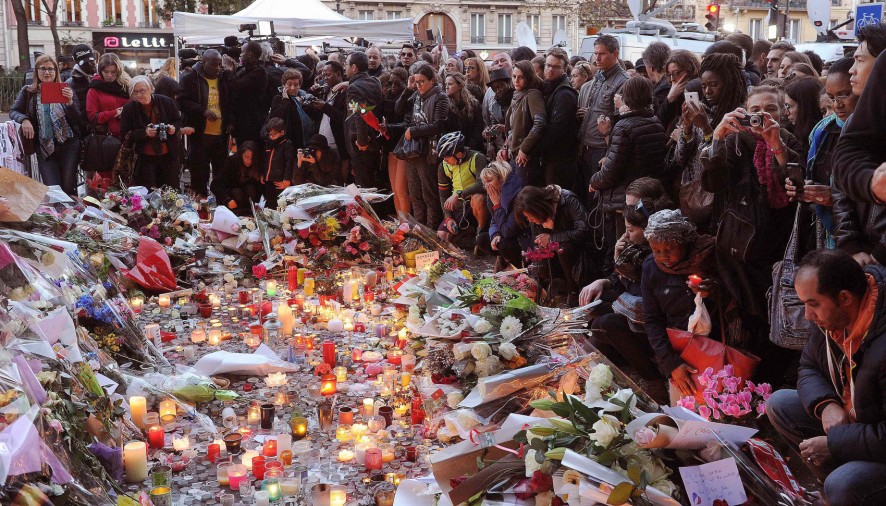Terrorists have left the world reeling. I don’t mean just last week, or two weeks ago, or this year, or fourteen years ago. There isn’t a time limit on this one; terrorism has been working since time immemorial. Human beings are remarkable though – we don’t stay scared. Unfortunately, tragedy reminds us that we have compartmentalised fear, and have pushed it to the back of our minds.
Recently French President Francois Hollande has said we must “destroy the Islamic State” in response to terror attacks. Unfortunately, there is an inherent violence in the rhetoric surrounding these events that makes subsequent security strategies dehumanising and power-centric. This will have a negative impact on defeating terrorism because of the narrative formed around ISIS.
Have you ever tried to explain how ‘so and so’ said something terrible but you just can’t remember who it was? A friend might helpfully remind you that you were in the library the day you first told him someone said something hilarious. Another might say she was sure that you pointed to someone with red hair. Wait, didn’t her name begin with H? It might have done. Well, the only girl whose name begins with H, who has red hair, and was at the library, that everyone remembers seeing, was Hannah. So it was probably Hannah.
The situation above is arguably similar to how I think narratives surrounding events can be shaped in society. It’s not illogical – it may be true and there are witnesses to the fact that Hannah was present on the day. However, that doesn’t mean that the person told you something awful was Hannah for certain; it means that it suits everyone to let the culprit be Hannah. It doesn’t matter if it was Hannah or not. What people are supposed to be getting out of this interaction is that there is a story to be heard. Likewise, when people talk of the attacks on Paris there is a fear that ISIS is on our borders and in our country and that we’re losing a battle against them. There is no concept of their size and real capabilities, who they are and what they are trying to achieve.
Over 120 people were killed and more injured on Friday night in Paris and the identity of a French national who was under surveillance for affiliation with radical Islamist groups was named as one of the suspects. They say they did it. Our government has said the security threat is high, if it happened in France, then why not here?
The link between the facts surrounding both events is that there is one straight fact: someone told me something terrible/people were indiscriminately murdered in an attack in Paris. Everything else is contingent on how people wish to piece things together. It is a narrative constructed by society. It is not wrong, it is not illogical, but it can be manipulated to achieve the aims of anyone involved.
The construction of narratives has been crucial to both terrorists and governments. For governments it is easier to use the name “Islamic State of Iraq and Syria/the Levant” or even “Daesh” because it is now familiar to the public and also specifies a certain geographical area and organisation of like-minded people. States willing to demonstrate the use of force can therefore have a target and definitive goal to show the public that the country’s resources are being put to good use. Grouping together insurgents of Middle Eastern origin or affiliation as the ISIS collective can have potentially damaging effects however, and can alter strategies and tactics that we as citizens of resource-rich nations vote for.
ISIS was conceived under the maxim ‘my enemy’s enemy is my friend’. As a consequence to political vacuums made in Iraq followed by Syria, those that had suffered first autocratic rule and then an agenda driven military intervention finally saw a chance at making their own way. However, the only route to political power is to gain a following and when there is no state, no infrastructure to support a politics then policies are of no use. Exploiting the existing tensions between religious sects, however, created a path toward political alliances with surrounding states. ISIS’s affiliation to the Sunni sect of Islam ensured that Sunni Muslims who were against them would be shunned by any Shia following. A competitive political environment was created and power could be channelled.
You can tell that Islam was not the driving ideology in the rise of ISIS because of how they have chosen when to use it. In the beginning they required tensions to exert influence and create a following. Now, they have reversed this, they wish to be known as the “Islamic State”. They are now all inclusive. But do you see the 1.5 billion Muslims allying with IS? No. They have demonstrated techniques to instil fear into the hearts of those within their reach and let isolated people around the world pass it forward. Indiscriminately, I might add. There were no registers of who was in each venue that was attacked in Paris, there were Muslims present and they have grieved. Like the divide created between Shia and Sunni, IS want Muslims against Non-Muslims. Even if Muslims do not agree with IS, eventually society will no longer accept them because of fear.
So, if you want to unite people you focus on similarities, if you focus on power you create divisions. You light up
national monuments red, white and blue, but on the same day you don’t highlight terror in Lebanon. You preach human rights, and then erect fences for fear of allowing in terrorists as if they exist only outside EU borders. You are focused on them gaining power; you are creating divisions; you are making them stronger.
Mahrukh Adnan Shaukat
[Image: Nairobi Daily News]

